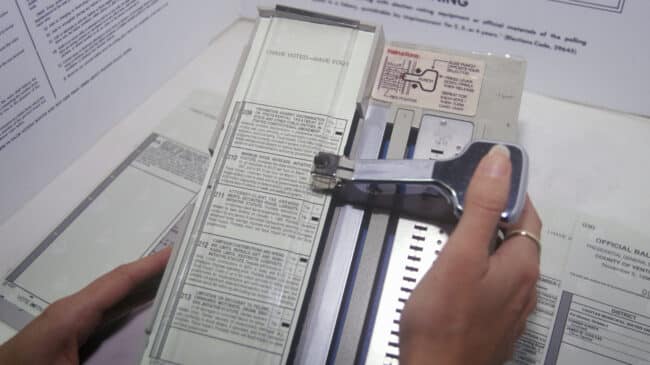Summary
Idaho Proposition 1 would change state primary elections from a closed system, in which only party members can vote in their respective parties’ primaries, to an open primary where anyone can vote for any party candidate. Candidates may indicate their party affiliation on the ballot, but they are not required to do so.
The initiative would also change the process by which candidates advance from the primary to the general election. Currently, the candidate receiving the most votes in each party’s respective primary advances to the general election—one candidate represents each party. Under the initiative, the top four candidates overall would advance to the general election, regardless of party affiliation.
Finally, the initiative would establish rank-choice voting in the general election. Under rank-choice voting, voters rank their preferred candidates rather than selecting one candidate to receive their votes. If no candidate wins a majority of first-choice votes, the candidate with the fewest votes is eliminated. That candidate’s votes are then redistributed based on voters’ ranked preferences. This process is repeated until one candidate receives a majority.
Fiscal Impact
The Idaho top-four ranked-choice voting initiative will likely have a negative fiscal impact, although the precise costs of implementation are unknown. Idaho Secretary of State Phil McGrane estimated that the cost of upgrading Idaho’s vote tabulation systems and equipment could range between $25 million and $40 million based on previous county purchases. Moreover, public education campaigns are likely necessary to inform voters of the ranked-choice voting process. Based on public education expenditures surrounding Alaska’s transition to ranked-choice voting, the Idaho Freedom Foundation estimates the cost in Idaho could be nearly $5 million. Switching to an open primary system may result in modest cost savings by eliminating the need print separate ballot styles for each party.
Proponents’ Arguments
Supporters of open primary systems generally argue that closed primaries exclude the 270,000 Idaho voters who are not members of a major political party from participating in taxpayer-funded elections. Therefore, the outcome of primary elections is decided by a relatively small group of partisan voters. They suggest that open primaries would require candidates to appeal to all voters, not just members of their own political party.
According to Luke Mayville, co-founder of Reclaim Idaho:
The most widespread grievance with the current system is that independent voters feel like they don’t have a voice. Those who haven’t aligned themselves with a political party understand that they are being blocked from voting in the most important elections, and it’s very clear to them that is unfair. Beyond the independent voters, Democrats and Republicans and nearly everyone else sympathize with independent voters and want them to have a voice.
Opponent’s Arguments
Opponents of open primaries argue that political parties are private organizations and should be allowed to determine the process by which their candidates are selected. Building a coalition of like-minded voters and nominating candidates that align with their preferences are among the core functions of political parties. Partisan primaries are an important part of that function. In their view, open primaries would weaken the ability of parties to nominate the candidates that most clearly align with their members’ beliefs. Moreover, they argue that allowing members of the opposing party to participate in their primary process could create opportunities for sabotage. For example, Idaho Republican Party Chairwoman Dorothy Moon has argued that the Idaho top-four ranked-choice voting initiative would “essentially sideline political parties from the primary process, enabling Democrats, independents and even Socialists to determine your nominee for the general election.”
Opponents also argue that the Idaho top-four ranked-choice voting initiative would make voting too complicated and that voters could be confused by the new system. For example, Moon has also stated that:
The American Republic has long been guided by the principle of one person, one vote. Ranked choice voting twists this system into something unrecognizable. The foundational premise of American elections is that both the winner and the loser must have confidence that the contest was completely above board. Ranked choice voting sows doubt and confusion, opens our elections up for fraud, and decreases trust in our electoral system.
Discussion
While expanding voter choice and allowing non-partisan voters to play a more significant role in elections are laudable goals, it is not clear that open primaries and top-four election processes are a good means for achieving those goals. Ranked-choice voting, on the other hand, is an effective strategy for offering voters more choices. Supporters of ranked-choice voting argue that it allows voters to choose their most preferred candidate first without worrying about wasted votes or spoiler effects. This would lend voters more choice. Supporters of the top-four component of the initiative further argue that allowing the top four candidates to proceed to the general election would provide voters with more choices.
Because ranked-choice voting alleviates concerns about wasted votes and spoiler effects, such ballots may lend more opportunity for minor party candidates. Moreover, there is evidence that ranked-choice voting can result in higher voter turnout and increased engagement with political campaigns. While critics have raised concerns that ranked-choice voting may be confusing for voters, research indicates that “ranked ballots do not raise the probability that a voter would cast a void (uncountable) vote, despite raising the probability of at least one violation of voting instructions.”
Regarding open primaries, political parties are fundamentally private organizations with the right to set their own rules for nominating candidates. To infringe on that right is to violate the freedom of association. No matter how large or powerful the two major parties may be, the government has no role in determining the process for their primary elections. That limitation does not prevent non-partisan voters from vocalizing their dissatisfaction with major-party nominees. Better alternatives for including non-partisan voters in the electoral process include allowing minor-party candidates to participate in debates and redrawing gerrymandered districts.
Overall, the Idaho top-four ranked-choice voting initiative has some laudable goals and contains some ideas worthy of consideration. However, mandating open primaries and a top-four system both conflict with other long-established goals of primary elections.

